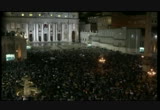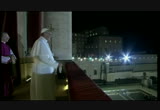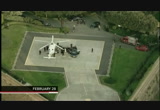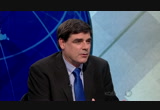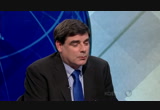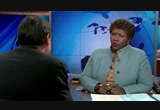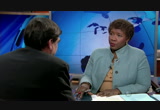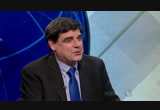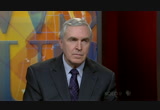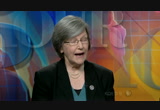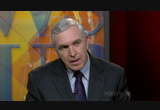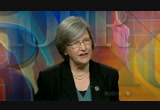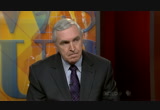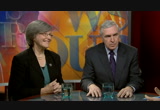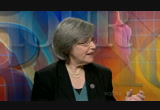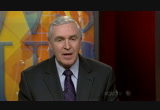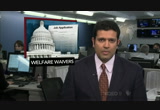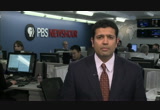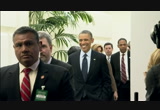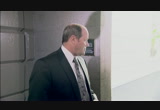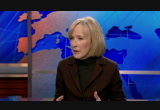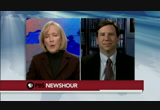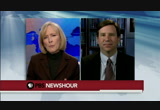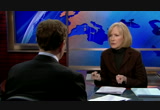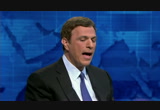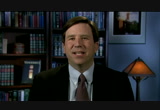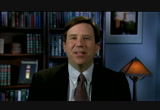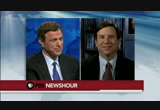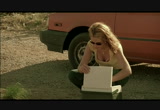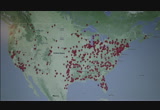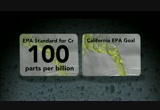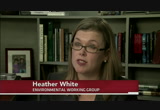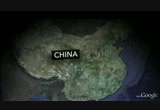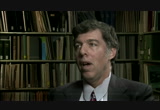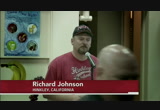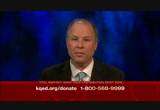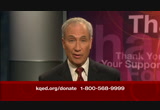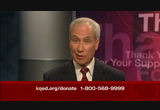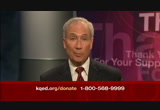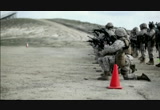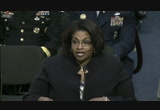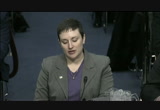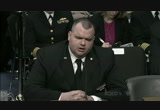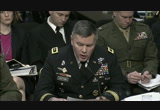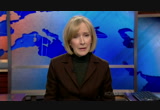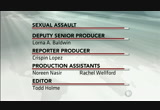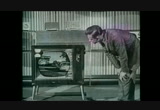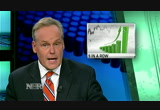tv PBS News Hour PBS March 13, 2013 6:00pm-7:00pm PDT
6:00 pm
thank you. >> ifill: catholic cardinals proclaimed a new leader of the church today: an argentine archbishop who will now be known as pope francis. it was a departure from centuries-old traditions, and it brought an outpouring of celebration in vatican city. a great wave of cheering broke as the much-anticipated white smoke rose from the chimney above the sistine chapel, by the tens of thousands, the faithful braved a chilly rain in st. peter's square. the bells of st. peter's confirmed the news the crowds had been anxiously awaiting for hours. after just five rounds of voting, a new pontiff had been elected, just one day after the conclave began its closed sistine chapel meeting. as word spread, even more
6:01 pm
pilgrims and tourists descended on the vatican, filling the square to capacity and packing into nearby streets to witness the historic moment. >> ( translated ): i cannot explain it. this is tremendous. this is the first time i am in rome and to have an argentinan pope, it's tremendous. >> ( translated ): we are very happy as argentinians, i think he is a very well prepared person and we need to pray for the holy spirit and jesus christ to give him the strength to lead the catholic church. >> ifill: italian military bands and the swiss guard also marched through the square. but the new pope's identity wasn't officially revealed until more than an hour later, when he finally emerged from the velvet curtained balcony of st. peter's basilica. the chosen one: cardinal jorge bergoglio of argentina-- the first pontiff from the first pontiff from the americas and the first non-european in more than a millennium. the 76-year-old chose the name pope francis the first. he delivered his first public address to the cheering crowd.
6:02 pm
brother cardinals had to go almost to the end of the earth to find him. but here we are. >> ifill: the new pope has spent most of his career in argentina, where he oversaw churches and priests across the country. now he'll lead the 1.2 billion members of the roman catholic church, all while addressing a number of difficult issues plaguing the church, from priest sex abuse scandals to allegations of corruption. pope francis succeeds benedict the sixteenth who stepped down last month. he was the first pontiff to resign in 600 years.
6:03 pm
pope francis the pope will be installed formally on tuesday. vice president joe biden will lead the historic delegation. we get more now from michael sean winters of the national catholic reporter. the first obvious question is, who is he? >> some of us are all scrambling. i think he was a surprise choice in part because of his age. what we've learned is he's a very simple and humble man who, when he became the archbishop of buenos aires chose not to live in in big mansion but got a small apartment. he takes public transportation and did away with the limousine. he's obviously conservative and i think you'll see none of the candidates were what we in america would consider doctrinal liberals. most importantly he's from latin america and for the last 50 years the issue the latin american bishops have been dealing with is what is the preferential option for the poor mean and trying to wrestle with that on theologically but also practically. is it going to be just words or is it really going to galvanize the church to care for the poor.
6:04 pm
>> pelley: was it also important the pope come from an area of the world where there is growth? population growth in the church? >> i think so. i think this gets to the heart of the gospel which is good news for the poor and i think sometimes in america and in western europe we're simply too affluent to hear it anymore in the way it was intend tpwhud africa, latin america there are desperately poor people for them it is still good news. >> ifill: but he has no roman experience. that is work inside the vatican. he didn't come from that experience. does that put him in a disadvantage at all? >> this is the danger is obviously he -- although he's been on several congregations as a cardinal so he might know his way around he's never worked in rome and the danger is that the old guard will say, you know, we're not going to tell you where the bathroom is unless you do what we want. so we'll see. but he's a very strong leader in buenos aires, has a reputation as a decisive man and i suspect has a mandate from the cardinals to clean up some of the messes
6:05 pm
that are there. >> pelley: one of the things he said when he came out in the square today was -- or on the balcony was that he would be the new bishop of rome. he specifically talked about the city of rome. what was that about? >> again, this is our hope and at this point it's all speculation. on -- there's been so much centralization in the catholic church in rome over the last 150 years. and i think bishops trying to do their best don't want to be considered just branch managers. the bishop of rome is the pope, but that doesn't mean you're the bishop of the entire world. and too many pontiffs have acted in that way. and have been not giving local bishop it is authority and decision-making power that i think that they want and we're hopefully -- he will pursue that kind of decentralization of authority. >> ifill: even though pope francis wasn't the front-runner, if there is such a thing, since we don't know what goes on inside that conclave, he's still considered or it's been reported he was the runner-up in 2005 to
6:06 pm
pope benedict. >> it's hard to interpret that. one wonders -- you know, those were 40 votes he supposedly got in 2005 who were not voting for joseph ratzinger and that may indicate a certain amount of change. i just want to caution -- i think a lot of americans think -- when they think of reform and change they think we're going to have women priests. that was not a realistic expectation given the cardinals who were in there. i think what they mean by reform touched other issues, partly reorganization of the curia, its relationships with local bishops and, again, are we going to focus a little bitless maybe on the traditional latin mass and a little bit more on caring for the poor. >> ifill: so this is not a pope or a papacy we're going to see any kind of change when it comes to things like abortion or -- >> of course not. >> ifill: gay marriage. >> of course not. >> ifill: or adoption or any social issues that get us so worked up, especially in the united states? >> no, and these are not issues in the latin american church. when 50% of your people are
6:07 pm
living below the poverty line, shame on you if you're worried about other issues like that. you've got to be very hand on worried about feeding your people so they don't go to bet hungry at night. >> ifill: he was quoted as saying not too long ago "if the church remains closed in on itself, self-referential, it gets old." does that harken some sort of change that's imminent? >> you know, my worry is that the church does sometimes become very self-referential and when they talk about the new e advantagelyization they reduce it to teaching bishops how to use twitter and it has to mean more than that. it's curious he chose the name francis. francis faced a very corrupt church and very degenerate culture in his day and he changed it by kiss ago leper. >> ifill: we're talking about st. francis of aceasesy. >> yes. and that's how the church reforms, by becoming the gospel church. >> ifill: we have to go back to this process and how he came
6:08 pm
to be pope. was there anybody besides americans -- were there anyone besides americans who thought an american would be pope? >> it was evidently a strong candidacy for cardinal o'malley. it was being pushed by an african cardinal. >> ifill: the boston archbishop. >> and a couple latin american cardinals who were big fans of cardinal o'malley. we'll find out in the next couple of weeks, estimations and guesses about what the vote totals were. but i think that was a real -- there was a real buzz there. that was not just the media. >> ifill: michael sean winters of national catholic reporter, thank you so much. >> thank you. >> woodruff: for more on what pope francis' selection means for the future of the catholic church. ray suarez picks up the story. >> suarez: and for that we're joined by chester gillis, a dean and professor of theology at georgetown university. he has written extensively on the history of the papacy and catholicism. and sister simone campbell is the executive director of network, a progressive catholic organization which promotes social justice.
6:09 pm
well the new pope joked that the fellow cardinals went to the ends of the earth to find him. he is the first pope from the global south. in his context, sister, what does it mean to be socially progressive and doctrinally conservative? >> i think in the argentine context-- especially in the global south-- it means to be keenly aware of the suffering of people at the margins of society. he has spoken very strongly against the income disparities, against the concentration of wealth in the north, first world countries, against the consequences, the adverse consequences of globalization and globalized greed for people who are poor. and then he is apparently very conservative on some of the social issues. but that's very consistent with this whole idea that it's lifting up people out of poverty is the key. that's where jesus went, that's where jesus was.
6:10 pm
so i think he lives -- it's interesting he picked the name francis, because that -- francis was the most radical to reject the riches of his time and to embrace the whole concept of voluntary poverty, care for those at the margins. it's a significant step, i think. >> suarez: dean, he comes from a background of supervising priests rather than being a theologian or intellectual of the church. what practical aspect -- what practical application does that have in his new job? >> well, that means he's a pastoral person, which is probably a good thing for the church. he's also a jesuit and jesuits are intellectuals, all of them virtually, and a very powerful order in the church. so i think he has both sides. he has the pastoral side and jesuits are contemplatives in action. so there's a contemplation side and spiritual side but it is the activity side that has to manifest itself in culture and society and it has to be on the side of the poor as has been
6:11 pm
said. that's part of his orientation. he supervised priests so he knows how to run an organization. he knows how to manage people. he knows the pressures of that job. but they haven't -- he hasn't let that go to his head. >> suarez: at the election of the last pope, benedict xvi, it was observed because of his age that the electors were anticipating a short papacy and, in fact, that's what they got. but pope francis i is 76 years old, sister. did they just do it again? >> well, i think they did just do it again. but i think this is also an important step because in our fast-paced globalized world i think maybe the electors have some insights that a very long papacy like with john paul had a lot of positives but there was a lot of anguish at the end of the papacy, a lot of things went undone. because we always need a variety of skills and a variety of gifts to make a difference and i think that's what they're choosing. some new gifts but not for too
6:12 pm
long. >> suarez: there's been stories of financial mismanagement, decline of the church in the west and, of course, the ongoing unfolding, consistent revelation of the sexual abuse scandals. what's job one after the installation? >> i think job one is to put a management team in place, so to speak, to make some changes probably, even in the curia, and put people in whom he trusts and who will make some changes in those structures and maybe even more transparency in the roman structure. you know, who would want this job? we wonder. we're saying my goodness, it's not an easy task. he's coming in at a very difficult time. this is not coming in when things are smooth so he can make a big difference in a short period of time potentially. and part of that would be by what kind of management structure and with whom he surrounds himself to manage the affairs of the vatican. >> suarez: but that's a tough thing when you're coming in from the outside, isn't it? >> it is extremely difficult coming from the outside. but the thing that he brings, it appears, is a sense of humility,
6:13 pm
a sense of humor-- which is wonderful-- and the capacity to welcome in everyone to the center. and i think it's that capacity to welcome people in that will allow him to form a management team that can do something different. he comes from a democratic country which is -- is led by a woman so he is used to having other voices to deal with. so i think the fact that he understands democracy, knows the value of various voices, has worked with strong women will allow us, then, to create a good team that is diverse and that is pastoral as well as administratively sound. >> suarez: his home, latin america, is also the home of a third of the world's catholics. but it's also a place that's seen a lot of decline in the church, a lot of move to protestant churches, to a more exuberant form of worship. great inroad in the church. evangelism is being talked about a lot. that is spreading the faith, he's been living that struggle,
6:14 pm
hasn't he? >> yes, and the evangelism has been an evangelism to catholics. ironically. evangelism has been trying to convert people to catholicism. in this case it's the bring people back to catholicism as you suggested and latin america there's a great migration to evangelical protestantism that's problematic. in europe there's just a decline in religious interest and people just drop out. so to evangelize in both contexts is a very important element of the church and someone who can carry that message but also has a certain credibility about his own character and humility i think will help in that. but it's a struggle. it's not going to be easy. this is not going to turn around on a dime. >> suarez: sister, what are your hopes now? we're approaching the installation of a new pope, the seating and anointing of a new pope and easter. >> well, i live in hope and i think this peace of evangelization is very important because it's also that the people will evangelize our leaders. our leaders between church need to hear from ordinary people and
6:15 pm
that, i believe, pope francis i has already been touched by them. but he will now need to be touched by the whole world and when you touch the pain of the world as real there is a a solidarity, an engagement with the gospel, a living faith that blossoms forth and let's pray for a moment of blossoming. >> suarez: it must be a shocking thing to go to rome and then find out you're really never going to live in your home again. >> you're not going home. when you're elected, that's it. somebody brings your belongings from your home country and you are -- and you never have the same identity. you will be known as francis for the rest of your life and the first thing the cardinals do is pledge obedience to him. these were his colleagues and his peers a few hours ago and now he's the holy father, as he's referred to the in rome all the time. the holy father. it has to be an astonishing change to him. i'm sure he contemplated it to some degree but i'm sure it's humbling, i hope it's humbling and probably a little bit
6:16 pm
frightening saying "i hope i can do this. i hope i have the courage to do this, the insight, the spirituality and the stamina to do the job." >> pelley: dean gillis, sister simone, good to talk to you both. >> ifill: still to come on the "newshour": the search for bipartisanship; danger in your drinking water and sexual assault in the military. but first, with the other news of the day. here's hari sreenivasan. >> sreenivasan: the u.s. house voted today to block the obama administration from granting state waivers to work requirements under welfare. republicans charged the president is trying to gut the 1996 welfare reform law. last summer, the white house said it would grant waivers, if states can meet welfare-to-work goals by other means. so far, no state has applied for a waiver. the house bill is not expected to pass the democratic- controlled senate. a juvenile court in steubenville, ohio today opened a rape trial that's drawn international attention. the two defendants are high school football players, ages 16 and 17. they're accused of raping a 16- year-old girl last august.
6:17 pm
social media postings have fueled claims that other students should have been charged and that police under- played the incident to protect the football team. the police have denied it. in china, authorities near shanghai pulled hundreds more dead pigs from a river that provides drinking water to the city. in all, they've found more than 6,600 pig carcasses in the water since friday. officials say the dead animals may have been dumped by swine farms upstream. the shanghai city government said it is monitoring water quality, and that so far, there is no sign of contamination. on wall street, stocks managed small gains in another relatively calm day of trading. the dow jones industrial average gained five points to close at 14,455. the nasdaq rose more than two points to close at 3,245. those are some of the day's major stories. now, back to judy. >> woodruff: amid a backdrop of budget negotiations, president obama kept up his bipartisan outreach today. "newshour" congressional correspondent kwame holman begins our coverage.
6:18 pm
>> reporter: the president's meeting with house republicans at the capitol was his first with them, on their turf, since january 2009, a week after his first inauguration. in an interview that aired on abc this morning, he sounded a note of optimism. >> right now, what i'm trying to do is create an atmosphere where democrats and republicans can go ahead, get together, and try to get something done. >> reporter: but at the same time, the president said a sweeping, long-term deficit deal could be impossible, given republican opposition to higher taxes. >> ultimately, it may be that the differences are just too wide. if their position is, "we can't do any revenue," or, "we can only do revenue if we gut medicare or gut social security or gut medicaid," if that's the position, then we're probably not going to be able to get a deal. >> reporter: after the president left, house speaker john boehner replied that it's mr. obama who's the obstacle to getting a deal. >> we have a spending problem. we have to attack the spending. and the president understands,
6:19 pm
yeah we've got some long term spending that we need to deal with. but he's going to hold hostage the fact that he wants to raise taxes on the american people again. that's not going to get us very far. >> reporter: some republicans, such as house budget chair paul ryan, on msnbc today, also questioned whether the meetings with lawmakers are just for show. >> the question is, is he going was the so-called charm offensive a temporary, you know, poll-driven political calculation, or was it a sincere conversion to try and bring people together and start communicating? >> reporter: other republicans expressed more optimism about the talks and about the larger process of compromise. >> there are going to be places we are going to disagree, and he recognizes that we recognize it, but that doesn't mean that we can't find places where as he would say where there is overlap and try to do those things and so it was encouraging, i was glad to have him come. >> reporter: for now, house republicans are going ahead with ryan's budget proposal, unveiled yesterday, to balance the federal ledger by 2023, relying
6:20 pm
heavily on spending cuts and entitlement reforms. democrats in the senate are pushing their own plan, a 50-50 mix of spending cuts and higher tax revenues. neither plan is given much chance of being enacted into law. >> woodruff: with the president putting renewed emphasis on bipartisanship, we take a broad look at whether that has been a successful strategy in politics and policy. joining us are michael beschloss, our regular presidential historian and marc hetherington, a political science professor at vanderbilt university and the author of two books on polarization and trust in u.s. politics. welcome to you both. so we just heard some republicans, michael beschloss, questioning whether the president is sincere in this and we know separately that a senior official at the white house was telling a reporter that they thought that he put that the outreach was just joke because they didn't expect it to produce results. so the first question i want to get out of the way with both of you is has it made a difference
6:21 pm
historically whether presidents, political leaders, were sincere in an effort? >> oh, certainly. and they're usually sincere, particularly eager to be conciliatory when there's one or both houses of congress in the hands of the other party as is the case now but the last 25 years or so have been different in american history in the intensity of the combat between the two parties and the aversion to compromise and i think you're seeing is the suspicion of the opposite party. look what happened to charlie crist in florida. they embraced, that killed his political career and he's now a democrat. >> woodruff: to so the intensity has gotten worse. what about that, mark heatherring to be? is that how you see it? that we're dealing with a much more strongly felt version of what's been here before? >> i think michael is right, especially compared with 25, 30
6:22 pm
years ago. think about the reagan presidency and he was facing a house of representatives that was strongly democratic at that point but there were a lot of moderates in the democratic party back in that day and age. there were no moderates on either side of the aisle for a president to reach out to. in this case a democratic president reaching out to republican moderates. if there were then this would probably be a more successful effort. it's worth doing. i think it's one of those things where we live in these -- this media environment where all we hear is our side of things so getting the two sides together is certainly helpful process but whether it is able to overcome the polarization that we have these days, that's another story. >> woodruff: mark hetherington, i a question i often hear from people is is this a partisanship born out of ideological differences, strongly-held views that are opposite ends at the spectrum of belief or is it something structural that's due to the way
6:23 pm
the parties are organized? >> well, i think it's a little bit of both. back in 1950s and '60s there was a lot of overlap in washington. there were conservative southern democrats, northern northeastern liberal republicans. and these days those things have changed. you can't really find moderates and liberals in the republican party or conservatives and too many moderates in the democratic party. so part of it is really ideological. we all agree on the ends that we want. we want peace, we want prosperity. but the means that the parties have in mind about how to accomplish those end, they're quite a lot different. so bringing the parties together these days is very, very difficult. >> woodruff: michael beschloss, what about this question of whether it's borne out of ideology, strongly different views, or is it the structure of the way our politics -- >> i don't think it has much to do with ideology at all. you look at this intense conflict, and most people who are in congress now will say
6:24 pm
it's worse than they've ever seen it. you look at the kind of people who want to be the leaders of their party in congress, it's not a gerald ford of the old days, someone who could make deals with the other side and is friendly with people from the other party. it's someone who can be the most intense partisan leader. that's also different. and you'd think that this all came from there being issue differences like over the bank of the united states with andrew jackson or the runup to world war two, stay out or go in. franklin park zoo, 1940, nothing remotely close to that in terms of magnitude yet the intensity of the conflict is perhaps greater than most times in history. >> woodruff: yet if you were to sit a partisan republican and a partisan democrat the down here at this desk they would say "we have very different views on taxes, on the role of government." >> i would say they certainly do. but you look out in the historical context, does that rise to the intensity of the conflict over slavery, for instance, in 1860?
6:25 pm
i don't think so. >> woodruff: mark hetherington, how do you see that? >> maybe so, but hopefully we've come a long way since the 1860s and slavery. >> i hope we have. >> i would hope so, too. the fact of the matter is, there used to be a situation in washington where the parties had different wings. a moderate wing and a liberal wing. so the party leaders who tended to come from the political middle had to bring the various parts of the caucuses together. now the split is in the caucuses are in, say, between for the republicans between the conservative and the very conservative. there's very little centrist incentive to move the parties in that direction in congress and, you know, at this point i think republicans realize, boy, if we make a grand bargain with the president he's going to get credit for it, it's not going to be us. so the incentives in the process will have to change to see anything different happening. >> and they fear they might get primaried, which is a relatively recent verb but it's something that's very much on their mind
6:26 pm
in a way that wasn't so much before. the way you raise money is to exaggerate conflict. the way you get on -- not the newshour -- but most peeve too +*ef is to hype up your differences with the other side. so there are a lot of rewards for a member of congress who wants to be combative and a penalty if he wants to or she wants to compromise. >> woodruff: let me ask both of you to put this question in some context. given where we are today, what's the likelihood that the two sides this time are going to be able to come together and work something out. mark hetherington? >> well, i'm -- i'm a little bit pessimistic at this point. we know that the -- >> woodruff: only a little bit? (laughter) >> well, i'm more than a little bit pessimistic. we know the sides are drawn the way they are. it used to be there is a time when there were less partisan people in the public at large. so ronald reagan could go out to the public and say "hey, look, i have this idea.
6:27 pm
let's put pressure on your members of congress to come around to that." but that won't happen these days. both partisans in washington and partisans in the electorate, they don't like the other side. and that make compromise very difficult to come by. >> woodruff: how do you see it, michael? >> the last 12 years we had the first attack of the continental united states by someone else since the war of 1812. not much bipartisanship after that catastrophe. the worst economic cataclysm since the great depression, not too much bipartisanship after that, either so. my view is if they didn't knock it off after events like this, it is rather bleak. >> woodruff: so maybe we need to have a discussion on whether it matters that there's bipartisanship or not. whether we're better off if they don't agree. maybe they're telling us something. >> a lot to say. >> woodruff: michael beschloss, mike hetherington. thank you. >> thanks, judy. >> thanks for having us.
6:28 pm
>> ifill: now, "newshour" science correspondent miles o'brien begins a two-part look at america's drinking water, and the regulatory system that is supposed to guarantee its safety. his report is the result of a partnership with the center for public integrity. it begins in the small desert town that made erin brockovich a household name. >> come on, you want some water. come on, drink some-- drink. >> reporter: clean water is something most of us take for granted. but not roberta walker. she, her dogs, and her family drink spring water that is either bottled or trucked in. because where she lives, people can't drink the well water. welcome to hinkley, california. >> this was bought out, this home on the right, this is all boarded up. >> reporter: roberta drove me around town-- what's left of it. >> there was a home here on the
6:29 pm
corner and that of course is gone. >> reporter: it is a ghost town? >> ya, ya. >> reporter: the steady decline of hinkley is rooted here at a natural gas pipeline pumping station owned by the giant california utility pacific gas and electric. in the 1950s and '60s, p.g.&.e. admits it dumped 26 tons of coolant made of chromium 6 into unlined retaining ponds here. the chemical is toxic and causes cancer. it leached into the soil and contaminated the aquifer-- the drinking water in hinkley. the hollywood version of the story is writ large in the movie erin brockovich, released in 2000. julia roberts won an academy award for her portrayal of the crusading legal assistant who forced p.g.&e. into a $333 million settlement with the residents of hinkley in 1996.
6:30 pm
but for roberta, there was no hollywood ending. so your house was right about here? >> um, yes. >> reporter: p.g.& e. did buy and raze her old home, as they did for many others here. so she built this place on the outskirts of town out of harms way, or so she thought. so far, p.g.& e. has spent $700 million trying to clean up the stubborn mess. but the plume of chromium 6 tainted water persists. sheryl bilbrey is in charge of p.g.&e.'s remediation effort. why is it taking so long? >> it's a very complex project. we are highly regulated. there are a lot of interested parties. the other thing is it's very important to us that we get it right. >> reporter: recent testing shows there is still chromium 6 in the groundwater in roberta walkers neighborhood. it is less than it was in the bad old days, but roberta is still girding to move once again, this time away from hinkley.
6:31 pm
>> did you ever think you would ever have to deal with chromium 6 or p.g.e. again. >> absolutely not, absolutely not. in front of god and the world they said they were going to clean it up. >> reporter: and? >> and they didn't. it was just-- it's a shocker. >> reporter: for the real life erin brockovich it was also an unwelcome surprise. >> i thought it was being cleaned up. the state thought it was being cleaned up. the community thought it was being cleaned up. so here it is ten years later, i'm not paying attention because i thought it's all being handled. >> reporter: brockovich is now an environmental activist on a larger stage, curating a crowd- sourced map of reported cancer clusters, which she says are largely linked to chromium 6 contaminated water nationwide. >> there's more and more amounting evidence or what chromium 6 does to the human health, what it does to the
6:32 pm
environment, what it does to the air. every community that i deal with that has been exposed to chromium 6, they have the same health symptoms, they have the same problems. >> reporter: in 2010, a nonprofit advocacy organization, the environmental working group, tested tap water in 35 u.s. cities-- 31 of them were contaminated with chromium 6. utility testing records how about 70 million americans are drinking this tainted water. with evidence mounting that chromium 6 may be more dangerous than once thought, the environmental protection agency decided to revisit the drinking water standard for the chemical. the standard-- 100 parts per billion-- was set 20 years ago. it is 5,000 times greater than the california e.p.a.'s public health goal for chromium 6 in drinking water: .02 parts per billion. ann mason is a senior director with the american chemistry council, which represents the chemical industry. >> the people in the united
6:33 pm
states are drinking water that meets the e.p.a. safe drinking water level. >> reporter: would you say categorically, it's okay? everybody is safe? >> i would say if the drinking water meets the safe drinking water level that e.p.a. has set that level and that's the rule of the land as we see it right now. >> reporter: there is a lot of research that links chromium 6 in drinking water to cancer. in 2008, the national institutes of health weighed in with an eye-opening rodent study. it uncovered clear evidence that high doses of chromium 6 in drinking water cause cancer in rats and mice. heather white is executive director of the environmental working group. >> we think that science is clear. there's been a lot more research that we've seen of the last decade that shows that there is a big cause for concern about drinking hexavalent chromium whether it would be stomach cancer, whether it be liver damage, whether it be toxicity.
6:34 pm
>> reporter: after the erin brockovich movie in 2000, california lawmakers decided life should imitate art. they chartered a so-called blue ribbon panel of scientists to help set a chromium 6 drinking water standard for the state. one of the scientists on the panel was this man, dennis paustenbach. the "newshour" and the center for public integrity learned the company he ran, chemrisk, had been hired by pacific gas and electric during the lawsuit. at the time, the most compelling scientific study that linked chromium 6 in drinking water to cancer came from china in 1987. it studied villagers in liaoning province who lived near a chromium ore smelter and drank tainted water for years.
6:35 pm
the lead author-- a dr. zhang jiandong. found they had increased rates of stomach cancer. acting on behalf of its client p.g.&e., chemrisk paid zhang to redo his study. paustenbach offered this explanation before the california senate. >> after he saw the questions that we raised about the analysis, he went back and examined and said, "of course not, it can't be true. my original conclusions don't make sense." >> reporter: the revised study reversed the original conclusion that chromium 6 was the likely cause of the villagers developing cancer. scientists at the california environmental protection agency were skeptical and took a look at the underlying data themselves. allan hirsch is with cal/e.p.a. >> reporter: the original study itself, was it good science? >> well, our analysis which we completed in 2008 agreed with the original 1987 paper. we found that the rates of stomach cancer in these five
6:36 pm
villages were significantly higher than stomach cancer rates in the overall province. >> reporter: the california epa set its public health goal of .02 parts per billion in 2011. the next step, changing the drinking water standards, has not happened. there's been a fair amount of study about hexavalent chromium over the years. is that scientific jury in? >> i don't think so. there are a lot of scientists that are still debating that question. i think that's why the process has taken so long from what i've read both at e.p.a. and at the state level. so, i think they're still trying to figure out exactly what is the right answer there. >> reporter: back in hinkley, i got tour of the massive p.g.& e. cleanup project. kevin sullivan is the engineer in charge. they have buried a concrete barrier and are pumping ethanol into the ground, which converts chromium 6 into a more benign
6:37 pm
form of chemical called chromium 3. they have also planted acres of alfalfa that is irrigated with the tainted water. the rich organic soil also makes the conversion. so that is now chromium 3 in your hand. >> exactly. >> reporter: there is so much alfalfa, the utility now owns a thriving dairy farm. but since the ethanol injections began, a new problem seems to have surfaced. residents have started reporting elevated levels of arsenic and manganese in their wells. p.g.&e. says its occurs naturally and has always been there. nevertheless, when sullivan appears at community meetings here. there is dirty water on the table and angry accusations in the air. >> the community is in an uproar right now. we are not just being poisoned by chromium. we got high arsenic levels, manganese. all this can lead you to believe that p.g.e. really don't give a crap about anyone of you.
6:38 pm
>> i don't want to live here. i don't want my family here. i have no choice. no one will buy my home. who wants to move into this? >> reporter: but sullivan insists they are making progress. >> we have cleaned up like 54 acres. now i know that-- i know if it is not yours, what have you done for me lately, but 54 acres is a lot of progress. we have a long way to go but these are positive signs that we have been able to achieve in the last few years. >> reporter: it will be anopther 40 years >> ifill: in part two of his report-- on friday-- miles takes a closer look at the environmental protection agency's system for regulating toxic chemicals in the environment. online, we go behind-the-scenes in hinkley and you can also check out chromium levels in the water of 31 u.s. cities. >> woodruff: we'll be back shortly with a look at sexual assault cases in the u.s.
6:39 pm
6:45 pm
>> woodruff: finally tonight, we return to the issue of sexual assaults in the military. earlier today, victims testified before congress about what they went through and the changes they think need to be made in the armed forces. women in combat zones are more likely to be raped by a fellow soldier than killed by the enemy. but, of the nearly 4,000 reports of sexual assault in the military last year, only 191 defendants were convicted at courts martial.
6:46 pm
and, because very few victims actually come forward, the real number of cases is estimated at 19,000. those numbers from the pentagon have fixed new attention on the problem with stories in "the new york times" and "rolling stone magazine" on rape survivors and the oscar-nominated documentary "the invisible war", filled with testimonials from military veterans who were sexually assaulted. >> i reported it two different times to my squad leader, and he told me there was nothing i could do about it because i didn't have any proof. they took me before my lieutenant commander, he says do you think this is funny, and i said what do you mean? and he's like, is this all a joke to you? i was like what do you mean? and he goes, you're the third girl to report rape this week are you guys like all in cahoots, do you think this is a game? >> woodruff: today, a senate armed services sub-committee took up the issue, starting with
6:47 pm
anu bhagwati of the service women's action network. >> during my five years as a marine officer i experienced daily discrimination and sexual harassment. i was exposed to a culture rife with sexism, rape jokes, pornography, and widespread commercial sexual exploitation of women and girls both in the united states and overseas. >> woodruff: from there, the panel heard first-hand accounts from victims, both women and men. brigette mccoy is a former army specialist. >> i'm a gulf war era service disabled veteran. i was raped during military service and during my first assignment. that was 1988, i was 18 years old, it was two weeks before my 19th birthday. >> woodruff: former navy petty officer brian lewis also appeared said to be the first male victim of military rape to testify before congress.
6:48 pm
>> during my tour on the u.s.s. frank cable, i was raped by a superior non commissioned officer. i was ordered by my command not to report this crime. >> woodruff: rebekah havrilla, a former army sergeant, said she did not report her rape initially and then... >> "approximately a year after separating from active duty, i was on orders for job training. and during that time i ran into my rapist at a post store. he recognized me and told me he was stationed on same installation. i was so retraumatized that i removed myself from training and i sought out assistance from chaplain who told me among other things that the rape was god's will and god was trying to get my attention so that i would go back to church. six months later, perp had taken photographs during my rape, at that point i felt it would always haunt me unless i did something about it.
6:49 pm
i went to c.i.d. and a full investigation was completed. it was the most humiliating thing i have experienced. i had to relive the entire event for four hours and explain what was going on in each of the pictures. >> woodruff: senator kirsten gillibrand-- chairing the subcommittee-- got a mixed response, when she asked if an outside prosecutor would help in reporting crimes, by moving the process outside the chain of command. >> an independent prosecutor would have made a world of difference. it would have gotten reporting outside chain of command and not enabled my commanding officer to sweep this under the rug. >> had i actually gone through with a full investigation while serving, i would have had to live with the men who were
6:50 pm
abusive toward me. that's not anything i would have ever wanted to go through. independent prosecutor aside. the challenge is partially changing the culture within the military with how women are viewed. >> woodruff: later, defense department officials acknowledged the military culture must change. major general gary patton directs the sexual assault prevention and response office. >> underpinning all efforts is need for culture change. where sexist behavior are not tolerated, condoned. i believe we will know change when prevention of sexual assault is as scrutinized as friendly fire. we will know when they produce same reaction as hearing racist slur. we are not there yet.
6:51 pm
>> woodruff: the new defense secretary chuck hagel promised stronger leadership on the issue, at his confirmation hearing last month. >> it's not good enough just to say zero tolerance. the whole chain of command needs to be accountable for this all the way down to the bottom. >> woodruff: hagel has already ordered a review of an air force general's decision to overturn a sexual assault conviction against an officer who served in italy. >> ifill: again, the major developments of the day: cardinal jorge bergoglio of argentina was elected pope-- the first leader of the world's catholics to hail from the americas. he took the name francis. vatican officials announced the new pontiff will be formally installed next tuesday. vice president biden will lead the u.s. delegation. >> woodruff: online, we give you three rules for getting the most from your social security benefits. hari sreenivasan explains. >> sreenivasan: the system for determining your eligibility is not very user-friendly. larry kotlikoff offers some
6:52 pm
general rules to help maximize your benefit check-- without the headache-- on making sense. why does china have its own plus, on monday's "newshour," we discussed what happens to your digital assets after death. in a live chat tomorrow at 1:00 p.m. eastern time. all that and more is on our website newshour.pbs.org. gwen? >> ifill: and that's the "newshour" for tonight. i'm gwen ifill. >> woodruff: and i'm judy woodruff. we'll see you on-line and again here tomorrow evening. thank you and good night. >> major funding for the pbs newshour has been provided by: ♪ ♪ moving our economy for 160 years. bnsf, the engine that connects us.
6:53 pm
>> and with the ongoing support of these institutions and >> support also comes from carnegie corporation of new york, a foundation created to do what andrew carnegie called "real and permanent good." celebrating 100 years of philanthropy at carnegie.org. >> and with the ongoing support of these institutions and foundations. and... >> this program was made possible by the corporation for public broadcasting. and by contributions to your pbs station from viewers like you. thank you. captioning sponsored by macneil/lehrer productions captioned by media access group at wgbh access.wgbh.org
6:58 pm
this is "nightly business report" with tyler mathisen and susie garrett. grinding higher, the dow ekes out a gain, another record high. and the first nine-day winning streak since 1996. taking the threat seriously. the president meets with ceos about how to deal with possible cyber attacks on american businesses and critical infrastructure. we'll tell you what it means to you. and a new leader. the catholic church elects a new pope. we'll tell you why this pope will need to be part spiritual leader and part ceo. good evening, everyone. welcome to our public television viewers. tyler, history in the making. not only in vatican city but on wall street. >> that's exactly right. the day began with lots of suspension in both places and it ended in both places with definitive outcomes. on wall street, that outcome was another record high close for the dow, and we begin there tonight. now, the dow's win streak
6:59 pm
continues. nine in a row. the blue chip index hasn't done that in 16 years. in fact it hasn't had a down day this month. today the dow added 5 points, ending at 14,455, it's seventh straight record closing high. the nasdaq was up nearly 3 points and the s&p 500 inched 2 points higher. that leaves it less than 11 points from its all-time closing high. now, the markets got an early boost from strong retail sales last month, which rose 1.1%, nearly double what economists had expected. that's the biggest spending gain in five months. but as courtney reagan tells us, those top line numbers can be deceiving. >> the government's headline retail sales number came in nearly double what economists expected for february. the details reveal a less than rosy picture when it comes to discretionary spending. >> i think the consumer is still in a fragile state. remains very resilient but with an air of underlying stability, which is the key.
332 Views
IN COLLECTIONS
KQED (PBS) Television Archive
Television Archive  Television Archive News Search Service
Television Archive News Search Service 
Uploaded by TV Archive on

 Live Music Archive
Live Music Archive Librivox Free Audio
Librivox Free Audio Metropolitan Museum
Metropolitan Museum Cleveland Museum of Art
Cleveland Museum of Art Internet Arcade
Internet Arcade Console Living Room
Console Living Room Books to Borrow
Books to Borrow Open Library
Open Library TV News
TV News Understanding 9/11
Understanding 9/11
